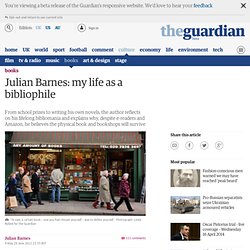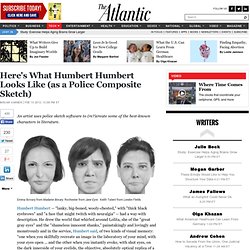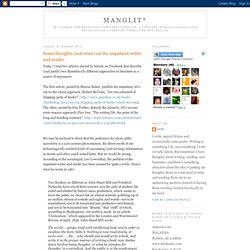

What Kind of Book Reader Are You? A Diagnostics Guide - Entertainment. The New Yorker's Page-Turner blog includes a book-reader coinage that got us thinking about our own reading styles.

There, Mark O'Connell confesses his dirty little reading secret: He doesn't finish books; he's a "promiscuous reader," a book abandoner. He writes, "I’ll start a book, get about halfway through it, and then, even if I’m enjoying it, put it down in favor of something else. " But it's not the books, it's him. "I like reading too much. I can’t say no," he writes. We understand. The Hate Reader. The Chronological Reader.
The Book-Buster. Delayed Onset Reader #1. Delayed Onset Reader #2. Julian Barnes: my life as a bibliophile. I have lived in books, for books, by and with books; in recent years, I have been fortunate enough to be able to live from books.

And it was through books that I first realised there were other worlds beyond my own; first imagined what it might be like to be another person; first encountered that deeply intimate bond made when a writer's voice gets inside a reader's head. I was perhaps lucky that for the first 10 years of my life there was no competition from television; and when one finally arrived in the household, it was under the strict control of my parents. They were both schoolteachers, so respect for the book and what it contained were implicit. Here's What Humbert Humbert Looks Like (as a Police Composite Sketch) - Megan Garber - Technology. An artist uses police sketch software to (re?)

Create some of the best-known characters in literature. Emma Bovary from Madame Bovary. Rochester from Jane Eyre. Keith Talent from London FIelds. Humbert Humbert -- "lanky, big-boned, wooly-chested," with "thick black eyebrows" and "a face that might twitch with neuralgia" -- had a way with description. But for those who cannot skillfully recreate or instantly evoke a face, in literature or otherwise, there is another way: the police sketch. This week, Brian Joseph Davis launched The Composites, a Tumblr that imagines the appearance of literary characters using both the text that describes them ... and composite sketch-rendering software used mostly by law enforcement. Here is Humbert Humbert: And here is Emma Bovary: The project was inspired, Davis told me, by a James Ellroy reference to "Identikits," which rendered composite images by asking crime witnesses to pick out individual features printed on index cards.
THE COMPOSITES. James Bond, Casino Royal & Moonraker, Ian Fleming “Bond reminds me rather of Hoagy Carmichael, but there is something cold and ruthless” …As he tied his thin, double-ended, black satin tie, he paused for a moment and examined himself levelly in the mirror.

His grey-blue eyes looked calmly back with a hint of ironical inquiry and the short lock of black hair which would never stay in place slowly subsided to form a thick comma above his right eyebrow. With the thin vertical scar down his right cheek the general effect was faintly piratical. Composites: Sketching Lisbeth Salander’s 'real' face. The Wonderful and Terrible Habit of Buying Too Many Books. Not pictured: annoyed roommate “…ownership is the most intimate relationship that one can have to objects.

Not that they come alive in him; it is he who lives in them. Ending the Cycle of Poverty with Banned Books. Some of my worst friends are books. A number of modern novelists have remarked on the profound oddity – or "madness", as Henry James (among others) once described it – of the way in which a novelist becomes inhabited by persons and voices.

Rather than regarding creativity as a benign or even divine form of inspiration, several have gone so far as to label this state of receptivity as a form of mitigated psychosis. The Business Case for Reading Novels - Anne Kreamer. By Anne Kreamer | 4:02 PM January 11, 2012.

Some thoughts (not mine) on the impatient writer and reader. Today, I read two articles shared by friends on Facebook that describe (and justify) two diametrically different approaches to literature as a source of enjoyment.

The first article, posted by Sharon Bakar, justifies the impatient, let's-cut-to-the-chase approach (Robert McCrum, "Are you ashamed of skipping parts of books? ", The other, posted by Eric Forbes, defends the leisurely, let's-savour-every-nuance approach (Pico Iyer, "The writing life: the point of the long and winding sentence", We may be inclined to think that the preference for short, pithy narratives is a 21st-century phenomenon, the direct result of our technologically enabled habit of consuming (and serving) information in tweets and other small sound bytes. But we would be wrong. According to the sociologist, Leo Lowenthal, the problem of the impatient writer and reader has been around for quite a while. The world ... gorges itself with intellectual food, and in order to swallow the more, bolts it. Are you ashamed of skipping parts of books? Over recent days, I've been reading Somerset Maugham's Ten Novels and Their Authors in the Vintage edition (a Christmas gift).

Before he gets stuck into the lives and masterpieces of 10 great authors (the book began as a commission from Redbook in the early 50s), Maugham gives us an essay on "The Art of Fiction" in which he devotes quite a bit of space to "the useful art of skipping". Skipping, says Maugham, is perfectly fine, because "a sensible person does not read a novel as a task. He reads it as a diversion". Culture. Is reading on the loo bad for you? The toilet papers ... experts believe the risk of spreading germs to loo-side literature is actually quite small. Photograph: Garry Weaser for the Guardian From the moment Ron Shaoul took it upon himself to investigate the practice of reading on the toilet, scouring medical literature and turning up nothing of note as to its public health consequences, the situation became clear that here, on his hands, was a big job.
Shaoul's curiosity was driven by his work as a doctor specialising in paediatric gastroenterology. He mustered some colleagues, drew up a questionnaire and had hundreds of people of all shapes and sizes complete it. What resulted was perhaps the most scientific attempt yet to shine light on a habit that rustles unseen behind closed doors. Shaoul, who published his study in 2009, lamented that toilet reading was woefully neglected by scientists, considering the habit probably dated back to the emergence of printed books. Shaoul cast his net wide.